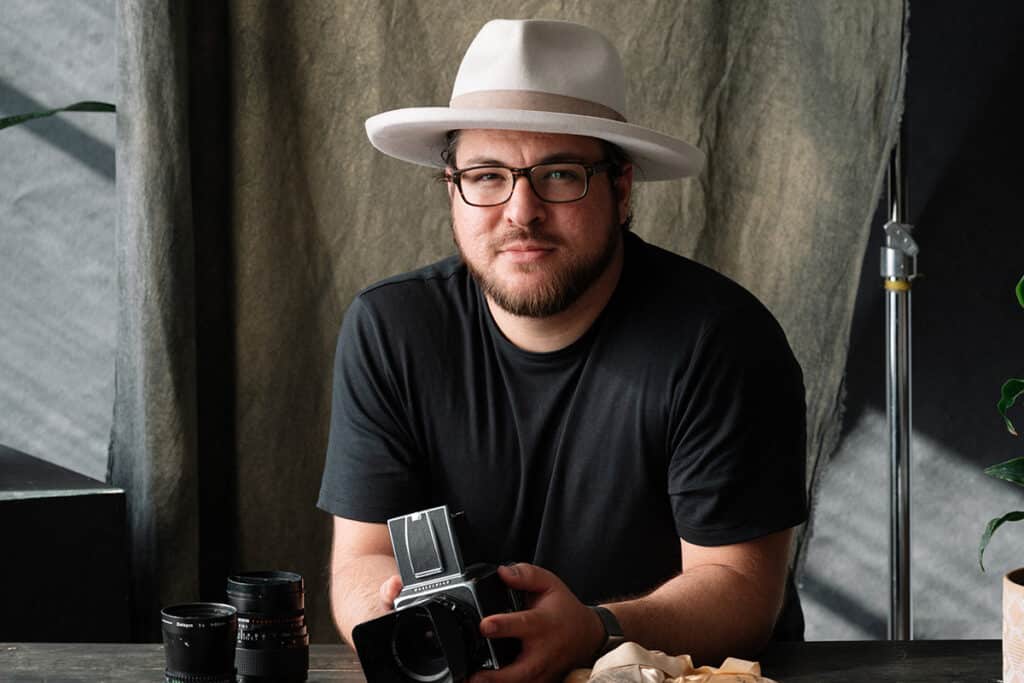There was a time when being an air hostess was considered a glamorous temporary job for the young and beautiful. But things have changed. Though flight attendants must still pay attention to their grooming, today many women and a smaller number of men make it a lifetime career. We talked to three capable San Antonians who spend their working hours at 10,000 feet in the air and above.
“Mommy work”
Fresh out of college, Patricia Oliver applied for a flight-attending job at Southwest Airlines. That was something she had always wanted to do, so she was dismayed when she did not get in. Not one to accept defeat, she found employment with Saks Fifth Avenue for a while and reapplied a year later. This time it was a go. “The second time I went in with a different attitude,” explains Oliver, now a 20-year veteran flyer and the mother of two young children. “The first time I was kind of shy and wore a conservative suit. By the second time, I felt more confident because I had had some experience dealing with people in a professional setting, and I told them, ‘I’ll keep on coming back until you hire me.’ I also wore a red suit.”
Though elated by her success, Oliver planned to stay on the job for only a few years before looking for other possibilities within the company. Twenty years later, she is still flying “the friendly skies” and has no desire to change careers. She likes the flexible work schedule and the good benefits the company offers, as well as “not being stuck behind a desk” and the dynamic nature of the work itself. No two days are alike, as passengers, flying conditions, airports and even aircraft crews regularly change. Southwest has 6,000 flight attendants, she says, and you seldom get to fly with the same crew more than once.
Though she chooses to live in San Antonio — in the house she grew up in — her base is Houston, which means she must “commute to work.” The evening before our interview she called to say that she might be stuck in Houston for the night as the flight to San Antonio had been delayed. She was returning home after spending three days on the job, flying from Houston to Denver, and from there to Hartford, Conn., then West Palm Beach, Tampa, Nashville, Durham, N.C., Nashville again, Orlando and back to Houston. There were overnight stops in Hartford and Nashville. On the home-bound leg to San Antonio she flies free, but there must be a free seat available. The above schedule pretty much represents her usual work routine: three days on, four days off, although she can choose to work up to the maximum of six days a week. Her seniority status confers certain privileges. Each month, Southwest posts the schedule for the entire month, allowing crew members to bid on when and where they want to fly, but they are awarded their preferences according to seniority. Novices are often “on call” or “on reserve” and must go wherever they are needed. “I like to work the p.m. and evening flights because I am not a morning person,” notes Oliver. “And I choose places with nice weather.”
On longer overnight breaks, the crew may go out sightseeing or having fun, but these days Oliver tends to stay in her hotel room working on home-related projects such as Christmas stockings for her kids. She honestly admits, however, that being away from the hectic life of a mother can be a welcome break.
Frequent travel may mess up one’s social life, but for Oliver it worked the other way around. She met her husband, Kirby Mose, on a plane when she asked him for some change. An automotive wholesaler, Mose traveled regularly to auto auctions in various cities. After she returned his change, they chatted a bit about cars, which might have been the end of it, except that he found himself on her plane two more weeks in a row. He eventually volunteered to help her buy a convertible, they exchanged phone numbers, and things developed from there. In 2004 Mose moved to San Antonio, and they were married a year later. The couple later bought the Oliver family home from her divorced mother and are still in the process of renovating it. Since he now works from home, Mose takes care of the kids — 3-year-old Lily and 23-month-old Chase — while his wife jets around the country. He tells us how Lily points up whenever she hears an aircraft overhead, saying “Mommy work, Mommy work.” However, he gives his wife credit for being the organizer in the family. Before leaving for her weekly stint, she always stocks the fridge, washes the laundry and writes down a schedule of what he needs to do regarding the kids.
Becoming a mother has helped Oliver tune into the needs of parents traveling with little ones, she points out. Babies and toddlers cannot always be expected to behave, and one must be patient and understanding. Misbehaving adults are another matter. She recalls an instance when a man became angry at a mentally delayed girl for kicking his seat from behind. He unleashed an irate tirade that brought the girl’s mother to tears. Oliver reprimanded him in no uncertain terms. “I won’t let you treat my passengers like that,” she told him. “If there is a problem, you report it to me, and I’ll handle it.” Four nearby passengers handed her their cards in case she needed witnesses at a later time. Another persistent problem is people who refuse to turn off their electronic gizmos when told to do so. On one occasion, she had to summon the captain, who escorted a recalcitrant fellow right out of the plane. A less obvious part of a flight attendant’s job is taking care of medical emergencies, from nosebleeds and anxiety attacks to injuries and cardiac problems. Though Oliver has had to administer oxygen in a few instances, no major medical crises have occurred on her watch. Should that happen, attendants can now connect with an emergency physician on the ground via MedLink and have the doctor guide them through emergency measures. “It’s a fabulous system,” she says. Is there something about her job she would like to change? we wonder. “Yes,” comes the prompt reply, “checked bags! If everyone would check their bags (rather than bring them on board), I would be so much happier. But I know that’s not going to happen.” As we all laugh at that, little Lily, who is sleeping in her mother’s arms, shifts a bit in reaction to the noise, then resumes her happy slumber.
26,000 hours in the air and counting
Like Oliver, Vicky Rymill finds that most passengers are polite and cooperative. “If you are nice to people, they are going to be nice, too,” says Rymill, who is also with Southwest Airlines. “But people were the nicest when I was pregnant. Businessmen who usually just work during the flight would show me pictures of their kids and would offer to help in so many ways.” Passengers became even more cooperative after the 9/11 tragedy shook our collective sense of security and made flying a more complicated process. People with special skills such as policemen or firefighters started volunteering their help “in case you need me,” while the flying public in general became more alert and observant. “People were on our side,” she says. Though that cooperative spirit seems to have faded somewhat lately, security is always a top priority for the crew. Not only are air marshals present on every flight, but pilots are also allowed to carry firearms if they are properly licensed, and cockpit doors are always locked. If anyone attempts to get to the cockpit, “we can do all that we need to do to stop them,” notes Rymill. Flight attendants check the entire aircraft after each trip and monitor everything at all times. In all her years of flying, Rymill has never had to deal with a terrorist act, but she and her fellow crew members must always be ready for potential emergencies.
While most travelers witness only the routine onboard service, the crew’s main responsibilities actually revolve around safety. In addition to administering first aid and communicating with passengers regarding safety measures, they must “secure the cabin” for liftoff and landing, prepare for emergency landing and assist with evacuation. Sadly, passengers are often inattentive and sometimes ignore the attendant’s instructions. “When we tell people to do certain things, they look at us like we are trying to make things unpleasant for them. But there are reasons for everything we say,” notes Rymill. “The reason you must put your tray table up is because that table may cut you in half under certain conditions.” And she echoes Oliver’s concern about cell phones and other gadgets. “People try to hide them from us,” she says, shaking her head. “Adult men! I had one man who was playing video games with his son and was hiding it from me. Hello, how old are you, sir? During takeoff, it’s crucial that air control be able to talk to the captain. Electronic devices sometimes cause interference.”
Over the years, Rymill has encountered her share of misbehaving folks, though their behavior was sometimes more inappropriate than dangerous. After asking for a blanket, one couple used it to have sex under it, for instance, while on another occasion, a “hussy” seduced a young recruit sitting next to her, and the two of them ended up in the bathroom together. Needless to say, they were promptly chased out of there. More commonly, some people assume that it’s the attendant’s duty to stash their bags in the overhead bin. It is not. With 500 passengers a day, that would be a backbreaking task indeed. A former cheerleader who married her high school sweetheart while still in college, Rymill had two children and years of experience as both employee and later owner of a talent agency before she even considered flight attending. Following a divorce and a few struggling years as a single mother, she realized she needed a stable work situation that came with health insurance. She applied to Southwest in 1988 and was hired. She was able to work Fridays through Sundays, when the children were with their dad. Good family support was crucial, including that of her second husband, Bob Rymill, whom she had begun dating at the time. The couple later had two children together.
Because she had to be gone from home so much, especially in the early years, Rymill often felt guilty for leaving her young kids with others. Her firstborn son, who was 8 when she took to the skies, would cry every time she had to leave. Several years later, however, at the age of 13, he shared with his mom a precious bit of insight: “You know, Mom, how I hated your job. Well, I’ve come to realize that because of your job, we as a family don’t take each other for granted like other families. I still hate to see you go, but I am always so glad when you come back.” Those words were a heartwarming gift to his mother. Today, even the younger set of kids is getting ready for college. In her spare time, Rymill runs a small antique/retro/vintage clothing store in Goliad called Funk in the Trunk, something she enjoys, but only as a hobby. She has no intention of leaving Southwest. There’s no mandatory retirement age, and the upbeat, personable Rymill clearly loves what she does. After 23 years of service, she’s got more than 26,000 hours of flying under her belt, and to her, being up above the clouds often feels safer than being on the ground. “People are scared of turbulence and storms, but I am not,” she says sincerely. “If I am in my seat and we go through turbulence, I fall asleep. I love it; I know it’s not going to hurt us.“
A master’s degree in life
American Airlines attendant Cindy Hadden-Fleming has always loved travel, any kind of travel. Her mother and aunt ran a travel agency in Utah, and the entire family took trips to places near and far. So a traveling job seemed a natural for her. Like others interviewed for this story, she lives in San Antonio and must commute to her base in Dallas, which is one of AA’s hubs. It’s not unusual, she notes. About 29 percent of all crew members do not reside in the base cities. Hadden-Flemming moved here after marrying her anesthesiologist husband, Dr. Keith Fleming. “My husband’s job is here,” she explains. “I love San Antonio, and I love my job with American Airlines, so I make it work.” In addition to flexible schedules, benefits and the other reasons mentioned by Oliver and Rymill, Hadden-Flemming credits her employment with enabling her to satisfy her travel lust. Although her professional trips are strictly domestic, she can take advantage of both AA’s and other carriers’ services to go to any destination she chooses for a fraction of the regular cost. She points out that she’s visited all seven continents, including two visits to Africa.
Most recently the Flemings spent two weeks on an icebreaker in Antarctica, a voyage that she still remembers with excitement. “I’ll show you some pictures,” she volunteers, then whips out an iPad to let me and the AA PR rep, Cameron King, view the photos. They are quite compelling. One shows Hadden-Flemming’s husband in an encounter with a particularly curious — or brave — penguin. Unlike his compatriots, who stayed clustered in the distance, this fellow came close to the human stranger just in time for the photographer to catch him looking up as if to ask, “And who might you be?” Despite temperatures hovering around 32 degrees — warm for Antarctica — the couple hiked and explored the icy landscape on foot every day. Next adventure will take them to see the polar bears. “American Airlines made all of that possible,” she says. As a first class attendant, Hadden-Flemming has dealt with many VIPs and celebrities over the years, including Barbara and Laura Bush; Jane Goodall; President Ford, who came onboard with a female body guard; and Dolly Parton, who graciously signed autographs for those who wanted them. Thanks to her travels and other varied interests, Hadden-Flemming feels she can chat with passengers on just about anything, and she makes an effort to speak with all. People have different interests and expectations, depending on where they are from and what is going on in their lives. While quite a few are frequent flyers who just want to do their own thing, she also gets the occasional couple going to Hawaii to celebrate their 40th wedding anniversary. For them, she will bring out the champagne and the “red-carpet” treatment to make their trip extra pleasant.
First class or not, however, Hadden-Flemming, too, has dealt with problematic individuals, and she is the only one interviewed for this article who actually had to execute an emergency evacuation. Her training kicked in the day the aircraft she was on had to make a potentially dangerous landing in San Francisco. On the first try, the landing gear failed to deploy, prompting the pilot to go up again and fly around for 45 minutes to use up fuel and reduce the aircraft’s weight. Then the second attempt was made. With the left wing crushed under the plane, the latter came gradually to a stop on its right tire while dragging the broken part. “I wasn’t afraid. I knew what to do to get us out of the aircraft,” she says. Fortunately, there was no fire, and she was able to evacuate everyone in minutes with firemen ready to receive them as they exited. That’s basically what she would like to convey to the public: that they are safe and in the hands of trained professionals. Every year, all flight attendants at all airlines undergo refresher training sessions that simulate all sorts of emergencies, including jungle, sea and desert survival. Following 9/11, these sessions began emphasizing how to physically protect oneself and others from attackers. Also, before each flight, crew and pilots hold a meeting to review the weather conditions, equipment and supplies, expected special-needs passengers or VIPs and anything else that presents itself.
Hadden-Flemming, who is childless and 50 — but looks more like 35 — plans on staying on the job for another 10 years. She is in the process of getting a pilot’s license, not to become a professional pilot but for fun trips of her own. There’s that travel lust again. “I like to travel because it’s like getting a master’s degree in life,” she says.




